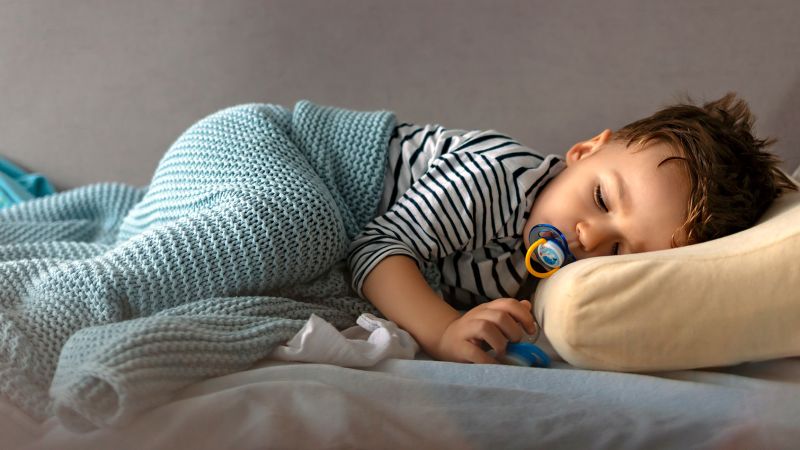Pacifier And Thumb Sucking: When Should Your Child Quit? A Parent's Guide

Welcome to your ultimate source for breaking news, trending updates, and in-depth stories from around the world. Whether it's politics, technology, entertainment, sports, or lifestyle, we bring you real-time updates that keep you informed and ahead of the curve.
Our team works tirelessly to ensure you never miss a moment. From the latest developments in global events to the most talked-about topics on social media, our news platform is designed to deliver accurate and timely information, all in one place.
Stay in the know and join thousands of readers who trust us for reliable, up-to-date content. Explore our expertly curated articles and dive deeper into the stories that matter to you. Visit Best Website now and be part of the conversation. Don't miss out on the headlines that shape our world!
Table of Contents
Pacifier and Thumb Sucking: When Should Your Child Quit? A Parent's Guide
Many parents wonder when their child should stop using a pacifier or sucking their thumb. It's a common developmental milestone, and understanding the "when" and "how" can ease anxieties and ensure a smooth transition. This comprehensive guide addresses common concerns and offers practical advice for parents navigating this phase.
Understanding the Habit:
Pacifiers and thumb sucking are natural reflexes for infants, offering comfort and security. These habits can provide soothing during stressful situations, aiding sleep and self-soothing. However, prolonged use beyond a certain age can lead to potential dental and speech issues. But don't panic! Most children naturally wean themselves off these habits, often between the ages of 2 and 4.
When to Start Thinking About Weaning:
The American Academy of Pediatric Dentistry (AAPD) recommends that pacifier use cease by age 3, and ideally before age 2, to minimize potential dental problems. Thumb sucking, while arguably more difficult to address, generally follows a similar timeline. However, the key is less about a specific age and more about observing your child's development.
Potential Problems Associated with Prolonged Use:
- Dental Issues: Prolonged sucking can affect the alignment of teeth, potentially leading to an overbite, underbite, or open bite. This might necessitate orthodontic intervention later in life.
- Speech Problems: Persistent sucking can affect speech development, potentially causing lisps or other articulation difficulties.
- Ear Infections: While not directly caused by sucking, prolonged pacifier use can increase the risk of middle ear infections in some children.
How to Help Your Child Quit:
Weaning your child off pacifiers or thumb sucking requires patience and understanding. Here's a step-by-step approach:
1. Gradual Weaning: Don't abruptly take away the pacifier or try to forcefully stop thumb sucking. This can increase anxiety and lead to regression. Instead, gradually reduce the frequency and duration of use.
2. Positive Reinforcement: Reward your child's efforts with praise and small rewards when they successfully resist the urge to suck. Focus on positive reinforcement rather than punishment.
3. Find Alternatives: Offer alternative comfort mechanisms, such as a special blanket, cuddly toy, or quiet playtime.
4. Address Underlying Issues: If your child is sucking excessively due to anxiety or stress, consider addressing the root cause. Talk to your pediatrician or a child psychologist for support.
5. Be Patient and Consistent: Weaning is a process, and setbacks are normal. Stay consistent with your approach and offer encouragement and support throughout the journey.
6. Consult Your Pediatrician or Dentist: Regular check-ups with your pediatrician and dentist are crucial to monitor your child's oral development and address any concerns early on. They can provide personalized advice based on your child's specific situation.
When to Seek Professional Help:
If your child is significantly struggling to quit, or if you notice any significant dental abnormalities, seek professional guidance from your dentist or a pediatric orthodontist. They can assess the situation and provide tailored advice or treatment options.
Conclusion:
Weaning your child off a pacifier or thumb sucking is a crucial developmental milestone. By understanding the potential risks, employing a gradual and positive approach, and seeking professional help when needed, you can help your child transition smoothly and confidently into this new phase. Remember, patience and consistency are key to success. This process is about supporting your child’s growth and development, not about perfection.

Thank you for visiting our website, your trusted source for the latest updates and in-depth coverage on Pacifier And Thumb Sucking: When Should Your Child Quit? A Parent's Guide. We're committed to keeping you informed with timely and accurate information to meet your curiosity and needs.
If you have any questions, suggestions, or feedback, we'd love to hear from you. Your insights are valuable to us and help us improve to serve you better. Feel free to reach out through our contact page.
Don't forget to bookmark our website and check back regularly for the latest headlines and trending topics. See you next time, and thank you for being part of our growing community!
Featured Posts
-
 Wasted Love Conquers Eurovision Austrias Jj Wins 2025
May 20, 2025
Wasted Love Conquers Eurovision Austrias Jj Wins 2025
May 20, 2025 -
 Bali Seeks Global Help To Improve Tourist Conduct
May 20, 2025
Bali Seeks Global Help To Improve Tourist Conduct
May 20, 2025 -
 Femicide What It Is Why Its Rising And What We Can Do
May 20, 2025
Femicide What It Is Why Its Rising And What We Can Do
May 20, 2025 -
 Peaky Blinders To Return Creator Reveals Key Changes For Upcoming Season
May 20, 2025
Peaky Blinders To Return Creator Reveals Key Changes For Upcoming Season
May 20, 2025 -
 Joe Biden Prostate Cancer Latest Updates And Public Response
May 20, 2025
Joe Biden Prostate Cancer Latest Updates And Public Response
May 20, 2025
Latest Posts
-
 Brett Favre Sexting Scandal Jenn Sterger Recounts Her Experience And Its Aftermath
May 20, 2025
Brett Favre Sexting Scandal Jenn Sterger Recounts Her Experience And Its Aftermath
May 20, 2025 -
 New Wwi Movie Featuring Daniel Craig Cillian Murphy And Tom Hardy Streaming Now
May 20, 2025
New Wwi Movie Featuring Daniel Craig Cillian Murphy And Tom Hardy Streaming Now
May 20, 2025 -
 Peaky Blinders Creator Announces New Series Detailing Key Departure
May 20, 2025
Peaky Blinders Creator Announces New Series Detailing Key Departure
May 20, 2025 -
 Controversy Erupts Jon Jones And The Ufcs Handling Of Aspinall Injury
May 20, 2025
Controversy Erupts Jon Jones And The Ufcs Handling Of Aspinall Injury
May 20, 2025 -
 Post Pectra Upgrade Investors Inject 200 Million Into Ethereum Funds
May 20, 2025
Post Pectra Upgrade Investors Inject 200 Million Into Ethereum Funds
May 20, 2025
